| Listing 1 - 10 of 12 | << page >> |
Sort by
|
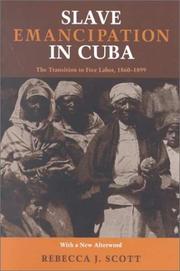
ISBN: 0822957353 0822972166 0691076677 Year: 2000 Publisher: Pittsburgh, Pennsylvania : University of Pittsburgh Press,
Abstract | Keywords | Export | Availability | Bookmark
 Loading...
Loading...Choose an application
- Reference Manager
- EndNote
- RefWorks (Direct export to RefWorks)
Slaves --- Plantation life --- Sugar trade --- Sociology & Social History --- Social Sciences --- Communities - Social Classes --- Emancipation --- History --- Sugar bounties --- Sugar industry --- Enslaved persons --- Country life --- Sweetener industry --- Persons --- Slavery --- CUBA --- 1800-1899 --- Kuba. --- Cuba
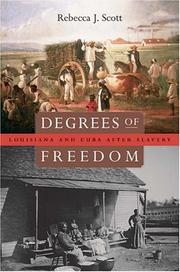
ISBN: 0674043391 9780674043398 0674019326 0674027590 9780674027596 9780674019324 0674267184 Year: 2005 Publisher: Cambridge, Mass. ; London : Belknap,
Abstract | Keywords | Export | Availability | Bookmark
 Loading...
Loading...Choose an application
- Reference Manager
- EndNote
- RefWorks (Direct export to RefWorks)
As Louisiana and Cuba emerged from slavery in the late nineteenth century, each faced the question of what rights former slaves could claim. This title compares and contrasts these two societies in which slavery was destroyed by war, and citizenship was redefined through social and political upheaval.
African Americans --- Blacks --- Citizenship --- Slaves --- Sugar growing --- Sugar --- Enslaved persons --- Persons --- Slavery --- Birthright citizenship --- Citizenship (International law) --- National citizenship --- Nationality (Citizenship) --- Political science --- Public law --- Allegiance --- Civics --- Domicile --- Political rights --- Negroes --- Ethnology --- Afro-Americans --- Black Americans --- Colored people (United States) --- Africans --- Civil rights --- History. --- Emancipation --- Social aspects --- Law and legislation --- Cuba --- Louisiana --- Louisiana (Province) --- Louisiana (Territory) --- Louisiane --- État de Louisiane --- Léta de la Lwizyàn --- Lwizyàn --- State of Louisiana --- US-LA --- La. --- Louisianne --- Territory of Louisiana --- District of Louisiana --- West Florida --- Territory of Orleans --- Race relations. --- Luisiana --- Black persons --- Black people
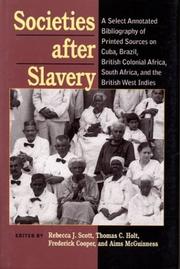
ISBN: 0822958481 Year: 2004 Publisher: Pittsburgh, PA : University of Pittsburgh Press,
Abstract | Keywords | Export | Availability | Bookmark
 Loading...
Loading...Choose an application
- Reference Manager
- EndNote
- RefWorks (Direct export to RefWorks)
Book
Year: 1995 Publisher: Baltimore London Johns Hopkins University Press
Abstract | Keywords | Export | Availability | Bookmark
 Loading...
Loading...Choose an application
- Reference Manager
- EndNote
- RefWorks (Direct export to RefWorks)
Digital
ISBN: 9780674043398 Year: 2022 Publisher: Cambridge, Mass. Harvard University Press
Abstract | Keywords | Export | Availability | Bookmark
 Loading...
Loading...Choose an application
- Reference Manager
- EndNote
- RefWorks (Direct export to RefWorks)
Book
ISBN: 0674065166 0674068408 9780674068407 9780674065161 9780674047747 0674047745 0674416910 Year: 2012 Publisher: Cambridge, Mass. : Harvard University Press,
Abstract | Keywords | Export | Availability | Bookmark
 Loading...
Loading...Choose an application
- Reference Manager
- EndNote
- RefWorks (Direct export to RefWorks)
Around 1785, a woman was taken from her home in Senegambia and sent to Saint-Domingue in the Caribbean. Those who enslaved her there named her Rosalie. Her later efforts to escape slavery were the beginning of a family's quest, across five generations and three continents, for lives of dignity and equality. Freedom Papers sets the saga of Rosalie and her descendants against the background of three great antiracist struggles of the nineteenth century: the Haitian Revolution, the French Revolution of 1848, and the Civil War and Reconstruction in the United States. Freed during the Haitian Revolution, Rosalie and her daughter Elisabeth fled to Cuba in 1803. A few years later, Elisabeth departed for New Orleans, where she married a carpenter, Jacques Tinchant. In the 1830's, with tension rising against free persons of color, they left for France. Subsequent generations of Tinchants fought in the Union Army, argued for equal rights at Louisiana's state constitutional convention, and created a transatlantic tobacco network that turned their Creole past into a commercial asset. Yet the fragility of freedom and security became clear when, a century later, Rosalie's great-great-granddaughter Marie-José was arrested by Nazi forces occupying Belgium. Freedom Papers follows the Tinchants as each generation tries to use the power and legitimacy of documents to help secure freedom and respect. The strategies they used to overcome the constraints of slavery, war, and colonialism suggest the contours of the lives of people of color across the Atlantic world during this turbulent epoch.
Creoles --- Blacks --- Negroes --- Ethnology --- Racially mixed people --- Migrations. --- Social conditions. --- Tinchant family. --- Sociology of minorities --- Migration. Refugees --- Genealogy. Heraldy --- History of North America --- Black persons --- Black people
Digital
ISBN: 9780674065161 9780674047747 Year: 2012 Publisher: Cambridge, Mass. Harvard University Press
Abstract | Keywords | Export | Availability | Bookmark
 Loading...
Loading...Choose an application
- Reference Manager
- EndNote
- RefWorks (Direct export to RefWorks)
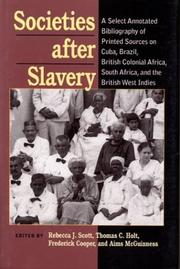
ISBN: 0822941848 Year: 2002 Volume: *7
Abstract | Keywords | Export | Availability | Bookmark
 Loading...
Loading...Choose an application
- Reference Manager
- EndNote
- RefWorks (Direct export to RefWorks)
Slaves --- Freedmen --- Esclaves --- Affranchis --- Emancipation --- Bibliography --- Affranchissement --- Bibliographie --- Freed persons --- Bibliography. --- Enslaved persons
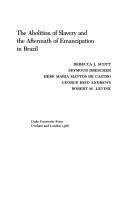

ISBN: 1282904108 9786612904103 0822381540 0822308886 Year: 1988 Publisher: Duke University Press
Abstract | Keywords | Export | Availability | Bookmark
 Loading...
Loading...Choose an application
- Reference Manager
- EndNote
- RefWorks (Direct export to RefWorks)
In May 1888 the Brazilian parliament passed, and Princess Isabel (acting for her father, Emperor Pedro II) signed, the lei aurea, or Golden Law, providing for the total abolition of slavery. Brazil thereby became the last "civilized nation" to part with slavery as a legal institution. The freeing of slaves in Brazil, as in other countries, may not have fulfilled all the hopes for improvement it engendered, but the final act of abolition is certainly one of the defining landmarks of Brazilian history.The articles presented here represent a broad scope of scholarly inquiry that covers developmen
Slaves --- Emancipation --- Enslaved persons --- Persons --- Slavery
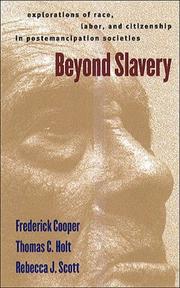
ISBN: 0807825417 0807848549 9780807848548 1469617374 9798890872265 9781469617374 Year: 2014 Publisher: Chapel Hill : University of North Carolina Press,
Abstract | Keywords | Export | Availability | Bookmark
 Loading...
Loading...Choose an application
- Reference Manager
- EndNote
- RefWorks (Direct export to RefWorks)
In this collaborative work, three leading historians explore one of the most significant areas of inquiry in modern historiography--the transition from slavery to freedom and what this transition meant for former slaves, former slaveowners, and the societies in which they lived. Their contributions take us beyond the familiar portrait of emancipation as the end of an evil system to consider the questions and the struggles that emerged in freedom's wake. Thomas Holt focuses on emancipation in Jamaica and the contested meaning of citizenship in defining and redefining the concept of freedom; Rebecca Scott investigates the complex struggles and cross-racial alliances that evolved in southern Louisiana and Cuba after the end of slavery; and Frederick Cooper examines the intersection of emancipation and imperialism in French West Africa. In their introduction, the authors address issues of citizenship, labor, and race, in the post-emancipation period and they point the way toward a fuller understanding of the meanings of freedom.
Citizenship. --- Freedmen. --- Race. --- Slaves --- Emancipation. --- Enslaved persons --- Freed persons.
| Listing 1 - 10 of 12 | << page >> |
Sort by
|

 Search
Search Feedback
Feedback About UniCat
About UniCat  Help
Help News
News